Oldest Domesticated Dogs In Croatia From 7500 Years Ago
November 3, 2020 - Croatia is well known as a dog-loving country, but just how long have there been domesticated dogs in Croatia? The oldest evidence is 7500 - 8000 years old
A new study published in the scientific journal Science ‘Origins and genetic legacy of prehistoric dogs’ has revealed fascinating details about the history of dogs, their origins and their co-existence with man. Lead by scientists from the University of Oxford, the Francis Crick Institute and the University of Vienna, four experts on Dogs in Croatia also participated: Dr. Sc. Dragana Rajković (Archaeological Museum, Osijek), Ph.D. Daria Ložnjak Dizdar (Institute of Archaeology Zagreb), Ph.D. Maja Pasarić (Institute of Ethnology and Folklore Research, Zagreb) and Dr. Sc. Mario Novak (Institute of Anthropology, Zagreb).
The study shows that around 11,000 years ago, at least five major historical dog breeds were separated and dispersed around the world. These breeds were all descended from a now-extinct species of wolf that was alive during the last ice age. These five dog breeds are the forefathers of today's domesticated dogs in Croatia, and everywhere else.
In an interview with Vecernji List, Dr Mario Novak explained some of the study's findings. He said that canines in Europe from the Mesolithic and Neolithic periods, including dogs in Croatia, appear to originate from two very different populations, one associated with Middle Eastern dogs and the other with Siberian dogs. Research has shown that over the last 10,000 years these early breeds have mixed and created the dogs as we know them today.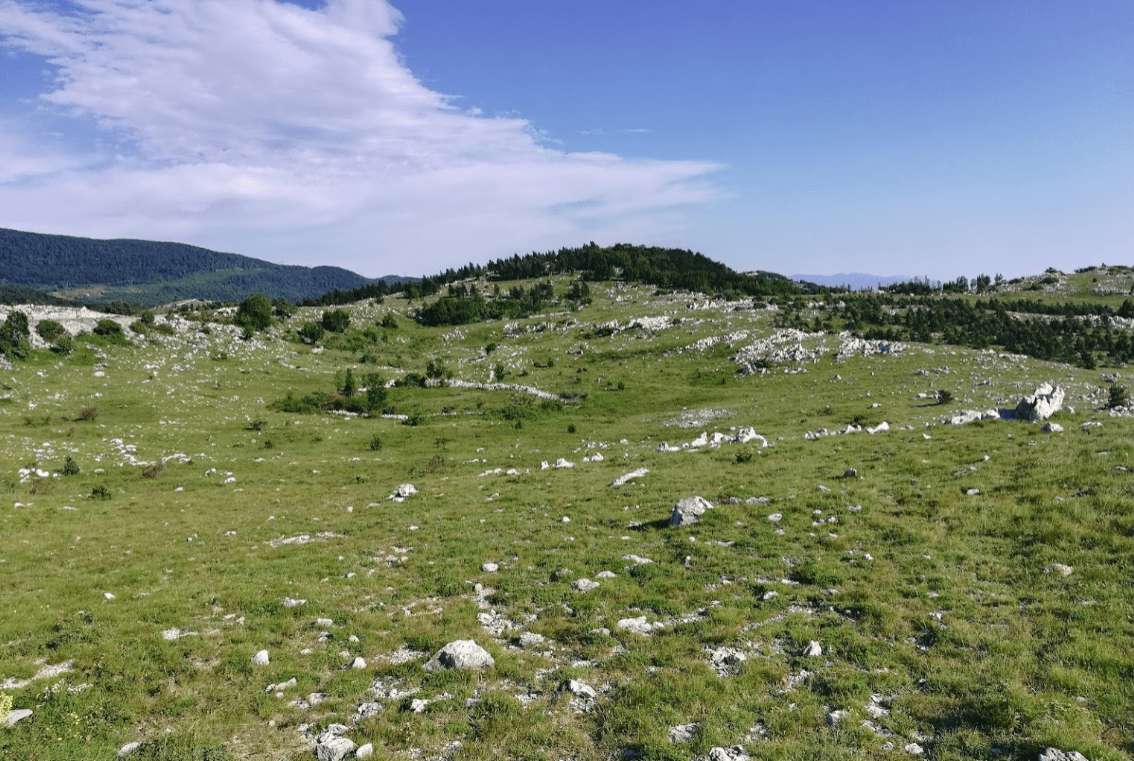 The archaeological site where evidence of the oldest domesticated dogs in Croatia was found is directly to the east of the modern city. You pass by the area of this former Neolithic settlement when you travel between the city and Zadar airport © Wikipedia
The archaeological site where evidence of the oldest domesticated dogs in Croatia was found is directly to the east of the modern city. You pass by the area of this former Neolithic settlement when you travel between the city and Zadar airport © Wikipedia
In their current forms, today's humans have existed for more than 40,000 years and dogs for about 14,500 years. The oldest evidence of modern domesticated dogs in Croatia come from remains found near Zadar. They have been dated to between 7500 and 8000 years old. There are six breeds of dogs that are today recognised as being indigenous to Croatia - Croatian sheepdog, Dalmatian, Istrian Coarse-haired Hound, Istrian Shorthaired Hound, Posavac Hound and the Tornjak. The vast majority of modern dog breeds originated over the last 200 years, so it is not clear if the oldest remains of dogs in Croatia are related to the indigenous breeds of today's dogs in Croatia.
“The question of why man and dog decided to coexist together is still not fully explained,” said Dr Novak to Vecernji List. “The relationship between man and dog is a very complex issue - this relationship is not one-way and most likely arose for mutual benefit, i.e. people realized the benefit they get from dogs and vice versa. The process most likely began about 25,000 years ago, and according to archaeological evidence, the process could have been completed approximately 14,500 years ago.”
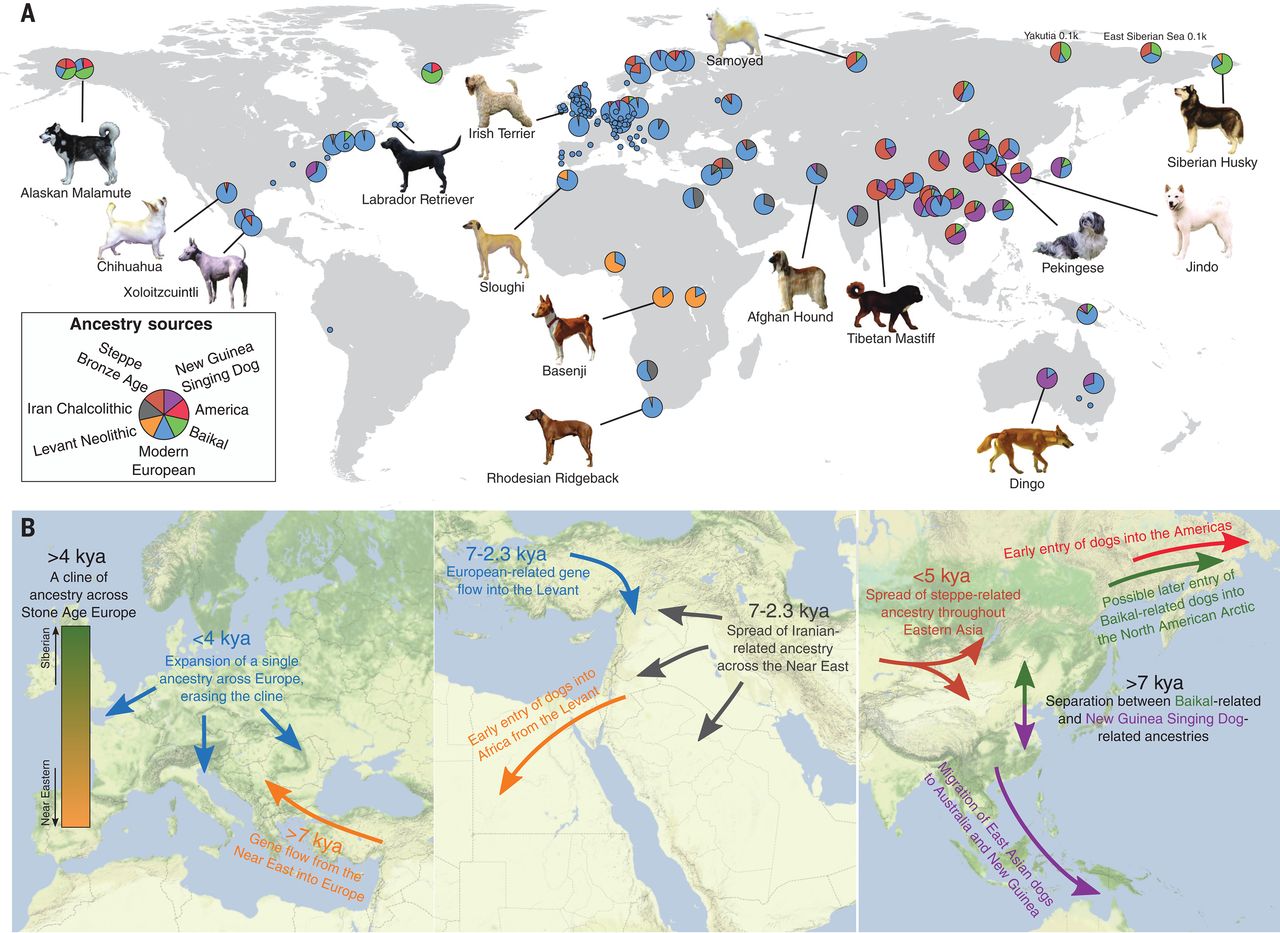 Graphic explaining ancestry of global dogs today, from the study
Graphic explaining ancestry of global dogs today, from the study
Dr Novak stated that the oldest evidence of modern domesticated dogs in Croatia comes from remains found in the Early Neolithic layer of the Crno vrilo archaeological site near Zadar. A fragment of the dog's lower jaw and two teeth from this site were dated to be approximately 7500-8000 years old. The ancient genomes of dogs in Croatia were sequenced for the first time in the Science journal study. One is from the Aljmaš - Podunavlje archaeological site, a Copper Age settlement (around 2600-2400 BC), the other from the site Sotin - Srednjea field, an older Copper Age settlement (around 3000-2900 BC).
For the latest travel info, bookmark our main travel info article, which is updated daily.
Read the Croatian Travel Update in your language - now available in 24 languages
Calling All Dog Lovers: Head to Nemetin this Week for Party of Century!
September 23, 2020 - Nemetin is the center for all dog-lovers this week! Namely, in this suburban settlement in the city of Osijek, you can walk shelter dogs until Sunday and win thousands of prizes, too.
As reported by Jutarnji.hr, from Monday until Sunday, every day from 10 am to 6 pm, in the Osijek shelter of the Pobjeda association, the party of the century will be held. One hundred eighty of their shelter dogs have a good time every day, and the party is traditionally called Povratak Otpisanih.
"Povratak Otpisanih is a way for dogs to reward the kind people who will take them for a walk. Children are welcome, and we hope that parents will bring them in as many numbers as possible. Anyone who comes to the asylum in the next few days, apart from coffee and cakes served by volunteers, will take part in tombola (raffle). Each ticket is a winning one, and a thousand prizes have been prepared," say asylum volunteers, who collected awards from almost 150 companies, family farms, and various institutions.
"When we talk about love for dogs, then Osijek is the most beautiful city in the world. 350 dogs are adopted dogs a year for which the City of Osijek, in cooperation with the Pobjeda Association, provides vaccinations, chipping, and castration to ensure a better life and is the best indicator of how dogs are loved. After foster parents, dogs love volunteers, people who come in their free time to walk those who are, through no fault of their own, locked behind fences," says Pobjeda.
Volunteers invite everyone to visit them, spend time with their dogs, and at the same time, they get a thoughtful gift - apart from phenomenal memories.
For the latest travel info, bookmark our main travel info article, which is updated daily.
Read the Croatian Travel Update in your language - now available in 24 languages
Firefighters Malinois Belgian Shepherd Sniffs Out Wanted Man in Split
Saturday, 5 September 2020 – More than 100 policemen were searching for the escaped man, but in the end it was a firefighters Malinois Belgian Shepherd that sniffed him out.
When detainee Branimir Čaleta managed to escape from custody on September 2, armed police were immediately on his tail. They knew where to look – he was seen running in the direction of Turska kula and the Park Mladosti in Split, near the Poljud football stadium.
But, though more than 100 officers were searching for the wanted man, in the end, it was a firefighters Malinois Belgian Shepherd called Flip that sniffed him out.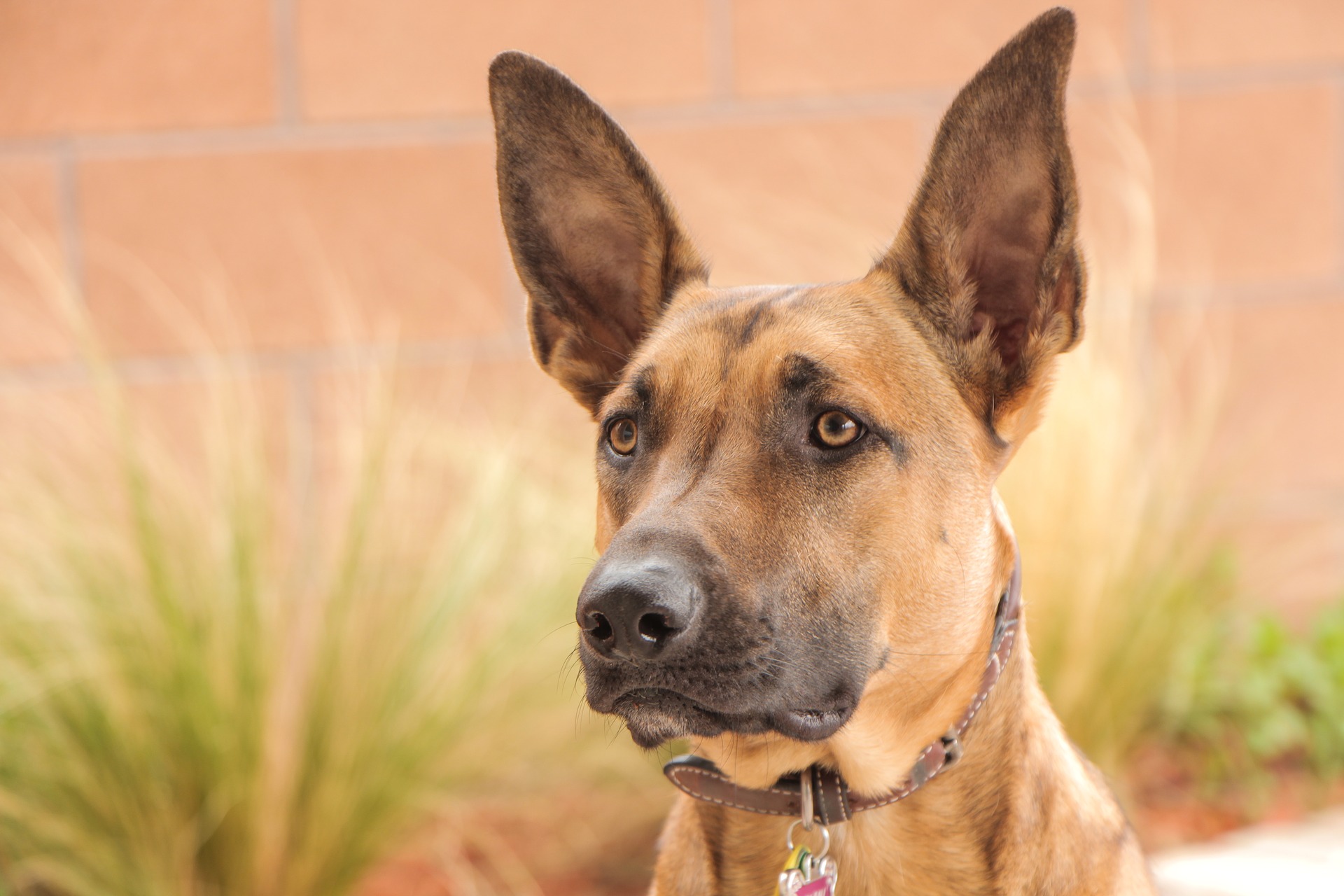
The Malinois Belgian Shepherd is used by armed services, the police and for search and rescue all over the world © TC Perch
Details of Flip's assistance were revealed in an interview undertaken with the dog's handler, Split firefighter Joško Čule by the 24 sata news outlet. Although he was not allowed to reveal details of the fugitive's capture, Joško did speak about his dog.
Flip is a search dog of the Public Fire Brigade of the City of Split, a firefighters Malinois Belgian Shepherd. He was trained to search in all environments, from urban areas and ruins to wild nature, and in all weather conditions. He is a family dog, loves spending time with children, and with the firefighters. He is an active member of the firefighting team in Split and works every day. Flip is taken into the field when necessary and has so far participated in four searches for lost people. He found them all.
This firefighters Malinois Belgian Shepherd is just one of the types of Belgian Shepherd. The other three are called Groenendael, Laekenois, and Tervuren. In Belgium, their country of origin, all four types are considered to be varieties of a single breed, differentiated by hair color and texture. Elsewhere, they are sometimes considered separate breeds.
Flip, the firefighters Malinois Belgian Shepherd is typical in having tan to brown short hair with patches of black. Belgian Shepherd Dogs are highly intelligent, alert, and sensitive to everything going on around them, and they form very strong relationship bonds. They are loyal, intelligent, fun, make good family pets and are very receptive to being trained, thus explaining the position of this firefighters Malinois Belgian Shepherd.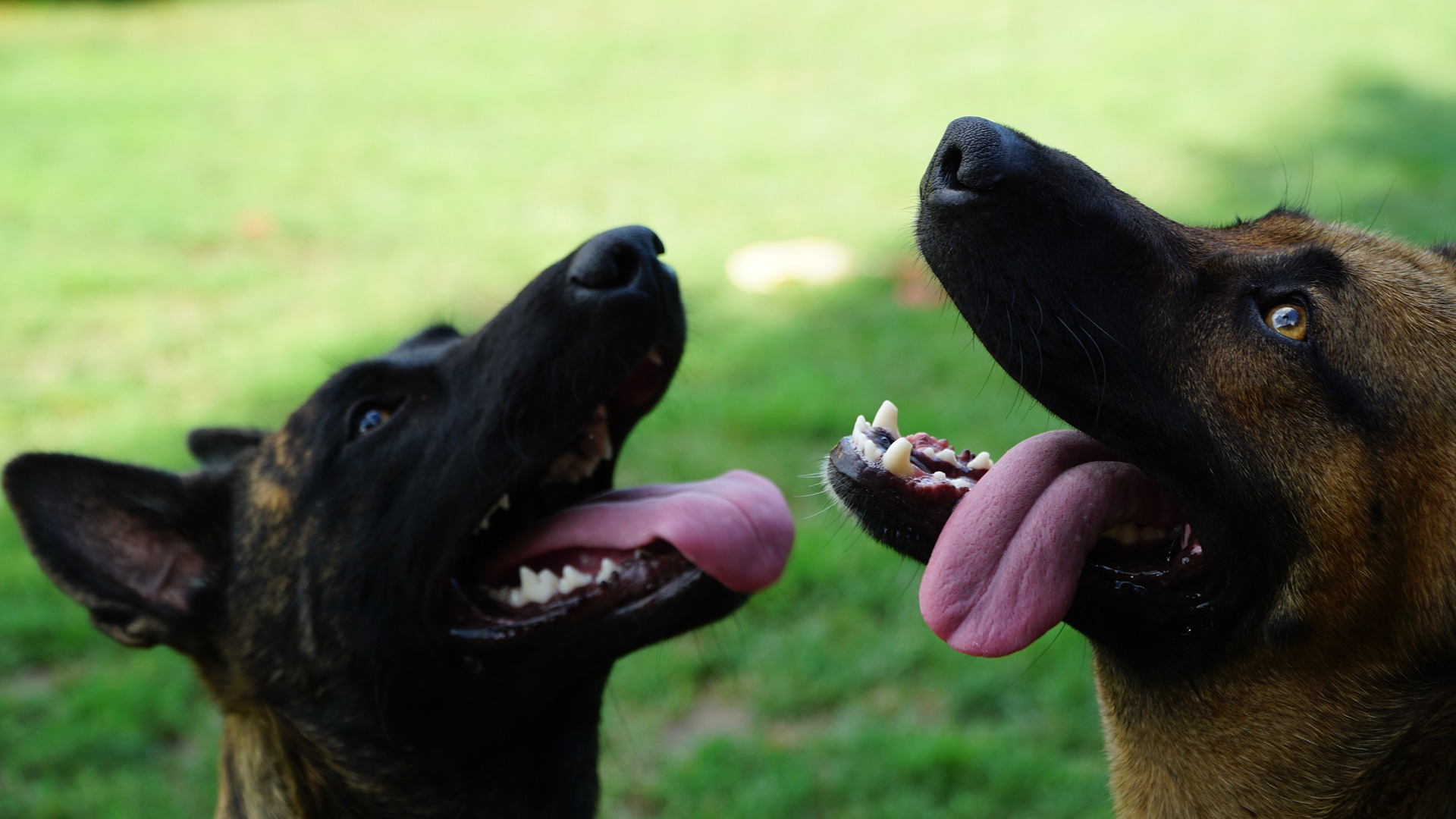
A Belgian Shepherd with a close relative, a Dutch Shepherd © Marius Zopole
It is not only firefighters who use these dogs. They are used as search and rescue dogs by other services and as police and military dogs. They have a good reputation as sniffer dogs, particularly in the field of finding illegal drugs. Several Malinois Belgian Shepherds have been decorated for bravery. They are very protective of their owners and handlers.
The US Secret Service, Israel Defense Forces, Indian NSG commando unit and Royal Australian Air Force use Malinois Belgian Shepherds in their work. The breed is second in number only to the German Shepherd for use across the whole of the US Armed Forces.
The fugitive Branimir Čaleta ran away from police while he was at court in Split, where he was appearing charged with the murder of his one-time girlfriend, a Ukrainian national. Čaleta is now back in custody, thanks to Flip, the firefighters Malinois Belgian Shepherd.
For the latest travel info, bookmark our main travel info article, which is updated daily.
Read the Croatian Travel Update in your language - now available in 24 languages
Zagreb Children's Hospital Gets Therapy Dog
September 3, 2020 – A Zagreb Children's Hospital is preparing to welcome its first canine member of staff – Jupi, a border collie
They are often said to be the most intelligent of all dogs. Used traditionally for herding livestock, border collies can learn a very large number of signals and commands. They are eminently trainable. Now, that intelligence is to be applied to the area of therapy, as one Zagreb children's hospital prepares to welcome its first border collie as a member of the team.
Still only a puppy, Jupi is being prepared for the role by her owner, Iva Zečević, a clinical psychologist at the Psychiatric Hospital for Children and Adolescents. At the moment, Jupi still needs to get her jabs, go for training and pass a therapy dog exam, Iva revealed to Jutarnji List journalist Lada Novak Starčević in a recent interview.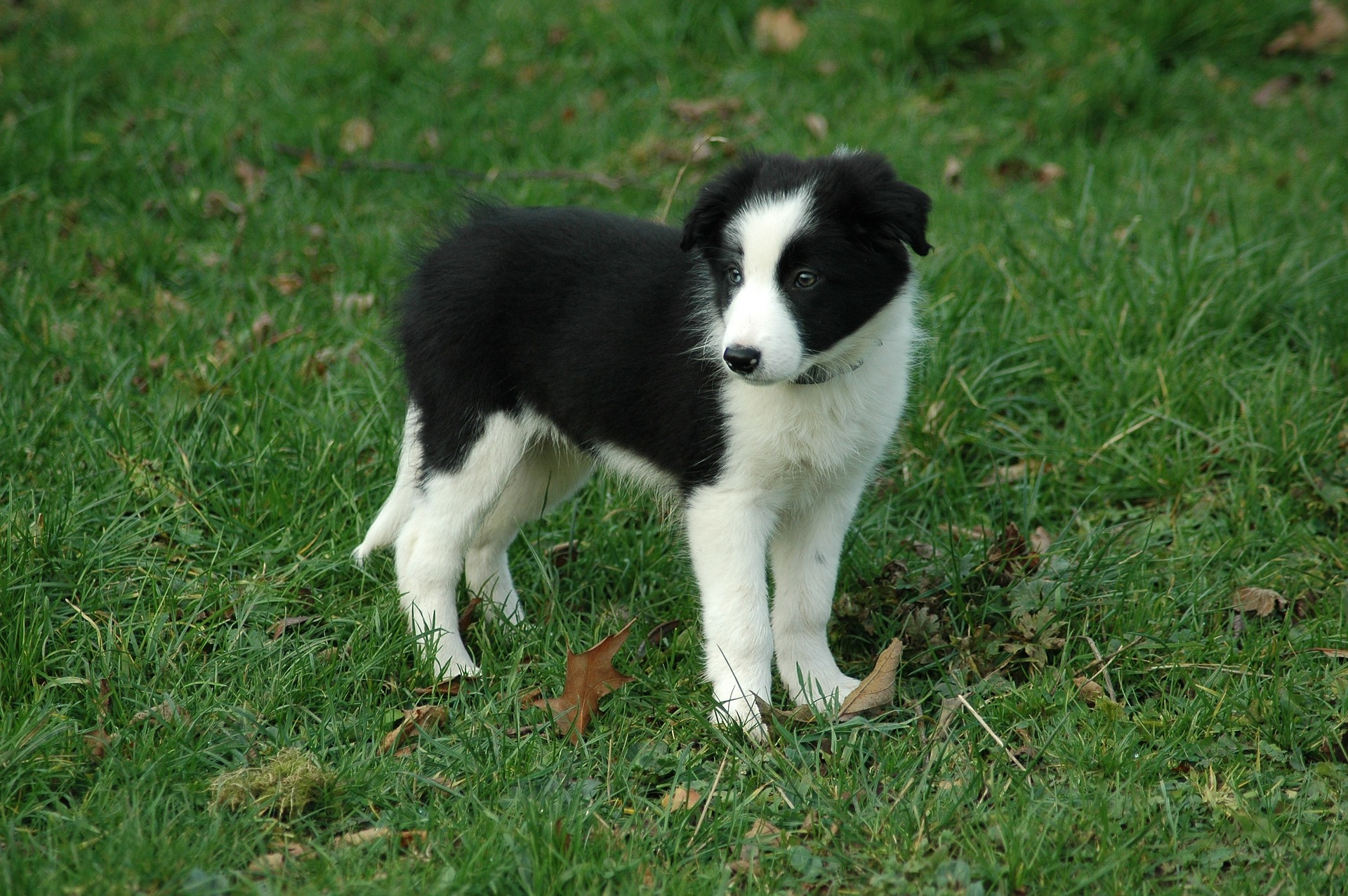
Border collies are very intelligent and eminently trainable. They take their name from the sheep farming lands which are situated on both sides of the Anglo-Scottish border © Yuppy Ermeton
Iva is undertaking the training herself with help from puppy coach Ana Odak and The Croatian Association for the Training of Guide Dogs and Mobility. Iva decided to dedicate herself personally to the task because she knows the Zagreb Children's Hospital where she works would struggle to pay for a fully trained therapy dog. Despite the time and costs involved in the necessary process, Iva has previously seen the positive effects dogs can have on her patients and knows it's a worthwhile undertaking. She is an experienced dog owner and has kept and trained several, although this is the first she has trained as a therapy dog.
Border collies are so clever that they thrive best in households that can give them lots of play and exercise. It is a British breed of dog, taking its name from the sheep farming lands which are situated on both sides of the Anglo-Scottish border. The word collie comes from the old Celtic word for useful.
All of today's purebred border collies can trace an ancestral line back to one dog. Old Hemp lived in Northumberland between 1893 and 1901 and was so skilled in his work with sheep, as well as having exactly the right temperament, that many shepherds used him as a stud for their future working dogs. Old Hemp is believed to have sired as many as 200 puppies to be reared as sheepdogs.
For the latest travel info, bookmark our main travel info article, which is updated daily.
Read the Croatian Travel Update in your language - now available in 24 languages
Monty's Underdog Marathon Swimming Race for Dogs and their Owners Held
As we've already written, Crikvenica near Rijeka, in the northern part of the Croatian coast, has one of the most amazing pet-friendly places in Croatia - Monty's Dog Beach Bar. This weekend an amazing Underdog Marathon swimming race was held there, for dogs and their owners!
The race is called "Underdog Marathon Crikvenica", and while we're not entirely sure how long the marathon exactly was, we know that this was the third annual race, and that the number of participants is growing each year, which makes the event bigger and more entertaining. This year it included the meet and greet with staff and dogs from the Dog Shelter maintained by the Crikvenica Veterinary Clinic, and after that the human and canine athletes started their swimming adventure.
Honestly, it was probably not much of a marathon per se, as the race took only half an hour, and it included a brief run along the coast and then a swim to the bar. Around twenty dog+owner couples participated, and you can see some amazing photos (including some which might be considered cheating) at Novi List. After the race itself additional contests were held: dog wine drinking and dog icecream eating competitions (no participation from the owners was required for those disciplines, (un)fortunately).
You might be wondering, were there prizes? Yes, there were. The winners of the marathon, Nimbus and his owner Marin, who also won the inaugural marathon in 2017, were awarded a free stay for two nights for two people and their dog (of course!) in Padova Premium Camping Resort on Rab. Runners-up, Zita and Igor, got a dinner for two and their dog (Zita, please, not some other dog!) at the same resort. Third-place winners won a full grooming service for the dog at Klempo grooming service in Kastav near Rijeka, plus cocktails for the humans at Padova resort. There was also a prize for the last-place finisher, an Adriatic version of a red lantern: the slowest dog+owner pair to finish the race got a brunch for two and their dog at Gastro Restaurant Karoca in Crikvenica.
Fastest doggy ice cream eater, who has not been publicly acknowledged yet, was awarded two ice cream cups at the Toš Kavana in Crikvenica, and a bag of doggy food, given by the Vet Centre Crikvenica. Fastest doggy wine drinker, also not yet made public, won free cocktails for their owner at the Three Monkeys Cocktail Bar in Rijeka.
After the races the fun continued, as there was barbeque, cocktails, and lots of dogs and dog-friendly people around them on the amazing Crikvenica beach!


